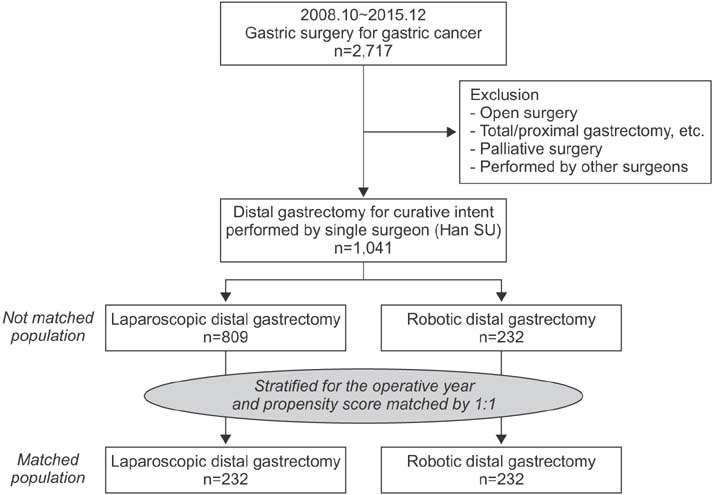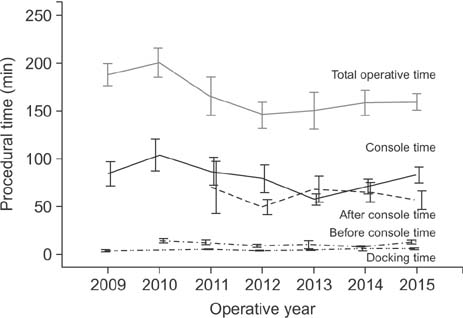J Gastric Cancer.
2016 Dec;16(4):240-246. 10.5230/jgc.2016.16.4.240.
Can Robotic Gastrectomy Surpass Laparoscopic Gastrectomy by Acquiring Long-Term Experience? A Propensity Score Analysis of a 7-Year Experience at a Single Institution
- Affiliations
-
- 1Department of Surgery, Ajou University School of Medicine, Suwon, Korea. sonsy@aumc.ac.kr
- KMID: 2389849
- DOI: http://doi.org/10.5230/jgc.2016.16.4.240
Abstract
- PURPOSE
It is hypothesized that robotic gastrectomy may surpass laparoscopic gastrectomy after the operators acquire long-term experience and skills in the manipulation of robotic arms. This study aimed to evaluate the long-term learning curve of robotic distal gastrectomy (RDG) for gastric cancer compared with laparoscopic distal gastrectomy (LDG).
MATERIALS AND METHODS
From October 2008 to December 2015, patients who underwent LDG (n=809) were matched to patients who underwent RDG (n=232) at a 1:1 ratio, by using a propensity score matching method after stratification for the operative year. The surgical outcomes, such as trends of operative time, blood loss, and complication rate, were compared between the two groups.
RESULTS
The RDG group showed a longer operative time (171.3 minutes vs. 147.6 minutes, P<0.001) but less estimated blood loss (77.6 ml vs. 116.6 ml, P<0.001). The complication rate and postoperative recovery did not differ between the two groups. The RDG group showed a longer operative time and similar estimated blood loss compared with the LDG group after 5 years of experience (operative time: 159.2 minutes vs. 136.0 minutes in 2015, P=0.003; estimated blood loss: 72.9 ml vs. 78.1 ml in 2015, P=0.793).
CONCLUSIONS
In terms of short-term surgical outcomes, RDG may not surpass LDG after a long-term experience with the technique.
Keyword
MeSH Terms
Figure
Cited by 1 articles
-
Successful Robotic Gastrectomy Does Not Require Extensive Laparoscopic Experience
Ji Yeong An, Su Mi Kim, Soohyun Ahn, Min-Gew Choi, Jun-Ho Lee, Tae Sung Sohn, Jae-Moon Bae, Sung Kim
J Gastric Cancer. 2018;18(1):90-98. doi: 10.5230/jgc.2018.18.e10.
Reference
-
1. Lee JH, Han HS, Lee JH. A prospective randomized study comparing open vs laparoscopy-assisted distal gastrectomy in early gastric cancer: early results. Surg Endosc. 2005; 19:168–173.2. Kim YW, Yoon HM, Yun YH, Nam BH, Eom BW, Baik YH, et al. Long-term outcomes of laparoscopy-assisted distal gastrectomy for early gastric cancer: result of a randomized controlled trial (COACT 0301). Surg Endosc. 2013; 27:4267–4276.3. Kim W, Kim HH, Han SU, Kim MC, Hyung WJ, Ryu SW, et al. Decreased morbidity of laparoscopic distal gastrectomy compared with open distal gastrectomy for stage I gastric cancer: short-term outcomes from a multicenter randomized controlled trial (KLASS-01). Ann Surg. 2016; 263:28–35.4. Kim HH, Hyung WJ, Cho GS, Kim MC, Han SU, Kim W, et al. Morbidity and mortality of laparoscopic gastrectomy versus open gastrectomy for gastric cancer: an interim report--a phase III multicenter, prospective, randomized Trial (KLASS Trial). Ann Surg. 2010; 251:417–420.5. Kim HH, Han SU, Kim MC, Hyung WJ, Kim W, Lee HJ, et al. Long-term results of laparoscopic gastrectomy for gastric cancer: a large-scale case-control and case-matched Korean multicenter study. J Clin Oncol. 2014; 32:627–633.6. Hu Y, Huang C, Sun Y, Su X, Cao H, Hu J, et al. Morbidity and mortality of laparoscopic versus open D2 distal gastrectomy for advanced gastric cancer: a randomized controlled trial. J Clin Oncol. 2016; 34:1350–1357.7. Kataoka K, Katai H, Mizusawa J, Katayama H, Nakamura K, Morita S, et al. Non-randomized confirmatory trial of laparoscopy-assisted total gastrectomy and proximal gastrectomy with nodal dissection for clinical stage I gastric cancer: Japan Clinical Oncology Group Study JCOG1401. J Gastric Cancer. 2016; 16:93–97.8. Kim HI, Han SU, Yang HK, Kim YW, Lee HJ, Ryu KW, et al. Multicenter prospective comparative study of robotic versus laparoscopic gastrectomy for gastric adenocarcinoma. Ann Surg. 2016; 263:103–109.9. Kim YW, Reim D, Park JY, Eom BW, Kook MC, Ryu KW, et al. Role of robot-assisted distal gastrectomy compared to laparoscopy-assisted distal gastrectomy in suprapancreatic nodal dissection for gastric cancer. Surg Endosc. 2016; 30:1547–1552.10. Son T, Lee JH, Kim YM, Kim HI, Noh SH, Hyung WJ. Robotic spleen-preserving total gastrectomy for gastric cancer: comparison with conventional laparoscopic procedure. Surg Endosc. 2014; 28:2606–2615.11. Suda K, Man-I M, Ishida Y, Kawamura Y, Satoh S, Uyama I. Potential advantages of robotic radical gastrectomy for gastric adenocarcinoma in comparison with conventional laparoscopic approach: a single institutional retrospective comparative cohort study. Surg Endosc. 2015; 29:673–685.12. Zhou J, Shi Y, Qian F, Tang B, Hao Y, Zhao Y, et al. Cumulative summation analysis of learning curve for robot-assisted gastrectomy in gastric cancer. J Surg Oncol. 2015; 111:760–767.13. Kim HI, Park MS, Song KJ, Woo Y, Hyung WJ. Rapid and safe learning of robotic gastrectomy for gastric cancer: multidimensional analysis in a comparison with laparoscopic gastrectomy. Eur J Surg Oncol. 2014; 40:1346–1354.14. Park SS, Kim MC, Park MS, Hyung WJ. Rapid adaptation of robotic gastrectomy for gastric cancer by experienced laparoscopic surgeons. Surg Endosc. 2012; 26:60–67.
- Full Text Links
- Actions
-
Cited
- CITED
-
- Close
- Share
- Similar articles
-
- Robotic Gastrectomy for Gastric Cancer: A Review of Postoperative and Oncologic Outcomes
- Current status of robotic gastrectomy for gastric cancer: A review of recent randomized controlled trials
- Laparoscopic Distal Gastrectomy for Gastric Cancer
- Robotic Surgery for Early Gastric Cancer
- Comparing short-term outcomes after totally laparoscopic distal gastrectomy and laparoscopy-assisted distal gastrectomy with Billroth I anastomosis: early experience of a single institution




